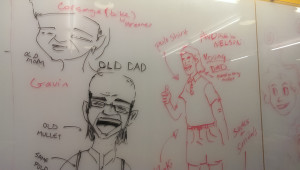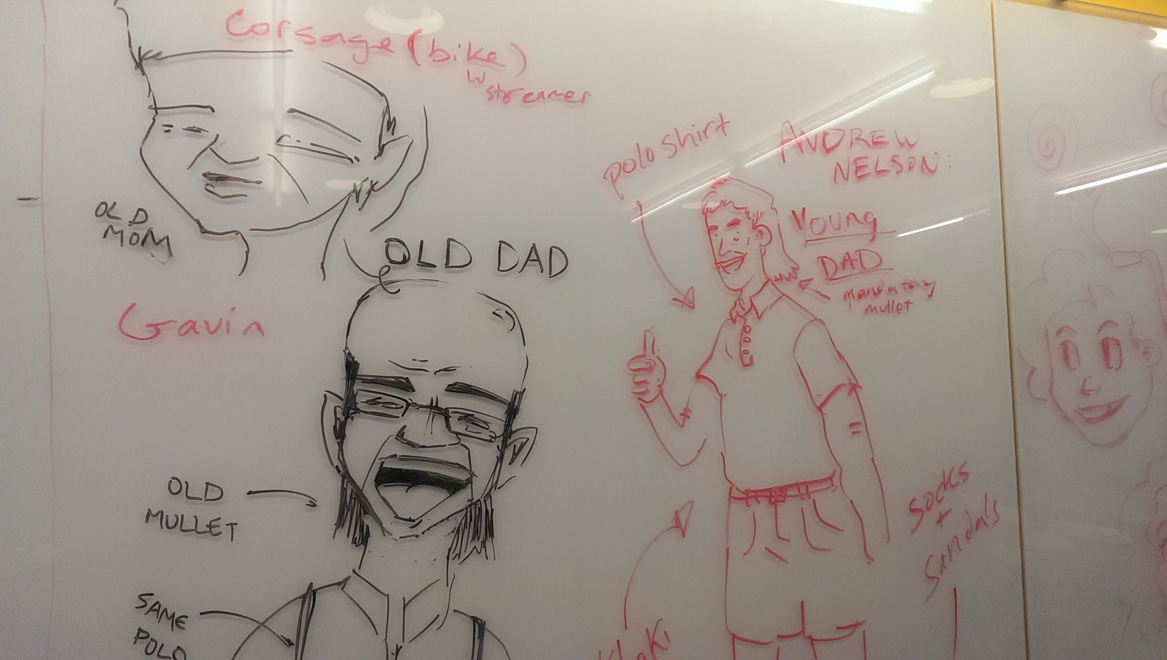
Stanford Storyboard Club, an unconventional group of Stanford visual artists, will roll out a variety of projects this year to provide a dose of amusement to Stanford’s campus.
“The particular brand of humor we’re going for isn’t everyone’s cup of tea,” said member Jimmy Daly ’17. “But it’s very much what some people would like to see on campus, and you just don’t see it enough.”
Storyboarding refers to a series of illustrations that act as a precursor to a movie, animation or other visual story. The club meets on Thursdays at 8 p.m. in the d.school to practice drawing, participate in storytelling exercises and create actual storyboards for various projects.
Last winter, the group made Valentine’s Day cards for every freshman with the intent of “inversing expectations” of the commercialized holiday, as group member Mirae Lee ’17 put it. The cards were both tender and ironic, playing with typical Valentine’s tropes.
“I’m lost in your eyes…” said the front of one card. When flipped over, the back read, “There’s no map, I haven’t eaten in days, something is following me. HELP.”
This quarter, the group is developing a comic book called “Necronancy,” which fictionally chronicles the Reagan family. “Necronancy” will be rolled out via print and online installments and tells the story of Nancy Reagan bringing Ronald Reagan back to life. The comic attempts to poke fun at the American perception of beloved presidents, as well Donald Trump’s campaign slogan, “Make America great again.”
“The concept of the Reagan family is very family-friendly, homey, 1950s,” said member Albert Gehami ’17. “Nobody’s told a [different] story.”
In addition to these creative side projects, the Storyboard Club works professionally with the Stanford Storytelling Project and Cardinal Studios. The club produces animations to accompany the Storytelling Project’s podcasts and creates storyboards for Cardinal Studios. For example, “Prisoner,” the first Cardinal Studios film, was written by Storyboard Club member Alexander Kucy ’17.
Lee explained that this is a way for members to develop the skills of storyboarding while working on personal projects with the rest of their time.
“Doing the official stuff gives you the practice and experience,” Lee said. “The point of the side projects is what you’re actually here to do — tell your stories.”
The Storyboarding Club was founded last fall and has 18 full-time members. The group already has a distinctive culture, mainly due to the time-intensive nature of storyboarding. Although they are serious about the artistic aspect of the work, members consider the group to be a haven from the rest of campus.
“It’s a really open, welcoming community of artists,” Lee said. “You can throw out a project like ‘Necronancy,’ and people will receive it with open arms … I don’t think there are other spaces like that on campus.”
This closeness is evident through the group crest, complete with the slogan “Iced Til We Die,” which refers to the group’s initiation process. “Iced” is idea of being covered with diamonds or swag, and when a group member “gets iced,” he or she is officially initiated into the group and is privy to a humorous internal mailing list.
“The group dynamic gets us going into this very excited, imaginative state,” Gehami said. “It helps procure a lot of interesting and unique storyboards.”
Most members have some connection to visual art, but others are intrigued by the humor or writing aspects of storyboarding. The club is home to engineering, math, English and economics majors, among others. What binds the group is their appreciation for telling stories, whether ridiculous or serious.
“What really got me was that storyboarding is a way to efficiently and simply tell someone something,” said member Nora Wheat ’18. “Anything you want to say, you can say in a storyboard.”
To keep creativity alive, the group refuses to repeat projects, and members were cryptic about what to expect for this year’s holiday season. They encouraged undergraduates to look out for a bold project.
“We gotta outdo ourselves,” Wheat said.
Contact Fiona Kelliher at fionak ‘at’ stanford.edu.
